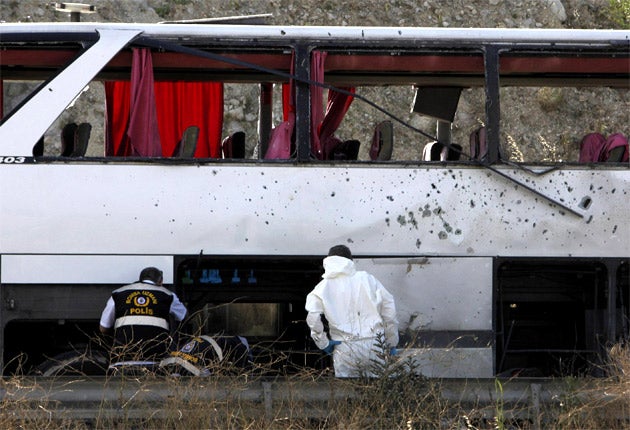Istanbul bomb marks end of Kurdish ceasefire

Your support helps us to tell the story
From reproductive rights to climate change to Big Tech, The Independent is on the ground when the story is developing. Whether it's investigating the financials of Elon Musk's pro-Trump PAC or producing our latest documentary, 'The A Word', which shines a light on the American women fighting for reproductive rights, we know how important it is to parse out the facts from the messaging.
At such a critical moment in US history, we need reporters on the ground. Your donation allows us to keep sending journalists to speak to both sides of the story.
The Independent is trusted by Americans across the entire political spectrum. And unlike many other quality news outlets, we choose not to lock Americans out of our reporting and analysis with paywalls. We believe quality journalism should be available to everyone, paid for by those who can afford it.
Your support makes all the difference.Suspected Kurdish rebels blew up a military bus in Istanbul, killing four people in an attack likely to lead to an intensification of the conflict between the Turkish authorities and the country's Kurdish minority.
The explosion, which left three army sergeants and a 17-year-old girl dead and two others seriously wounded, came after a violent weekend in which 12 soldiers and police were killed by PKK Kurdish guerrillas in southeastern Turkey. The provincial governor of Istanbul, Huseyin Avni, said the bombing was "a terrorist attack" the aim of which was "to create divisions, tensions and despair".
The resumption of guerrilla warfare brings to a final end an unofficial truce between the PKK and the government, which last year launched an initiative giving Kurds greater civil rights. That was partly an attempt to terminate a 26-year-civil war in which 40,000 people have been killed.
But the ruling Justice and Development Party, known by its Turkish acronym, AKP, of the Prime Minister, Recep Tayyip Erdogan, delivered on few of the promised reforms because it was frightened of being portrayed as soft on Kurdish rebels in forthcoming elections. Speaking at a service to honour the dead soldiers, Mr Erdogan said he would "annihilate" the PKK. "They will drown in their own blood," he said, adding that "such kind of bloody attacks will not be able to divert the direction of our nation to grow and be a strong and estimable nation."
Such is the degree of anger over the deaths of the Turkish soldiers that Mr Erdogan and other senior members of the government are in danger of being mobbed at funerals by angry relatives and members of the political opposition. Television screens and newspapers were yesterday dominated by pictures of soldiers' coffins draped with red-and-white Turkish flags.
Turkish commandos were also being dropped by helicopter along the mountainous border with Iraq, although in the past this has had little effect since the bases of the PKK are well concealed in caves and gorges on both sides of the border. Turkish warplanes have made bombing raids against PKK guerrillas in northern Iraq, but with limited effect.
In a statement, the PKK justified its military actions and the ending of its 14-month-old ceasefire by saying that its unilateral truce had become meaningless because the Turkish government had not reciprocated. With 6,500 experienced fighters in Iraq and Turkey, the group is probably capable of making pinprick attacks for as long as it wants. Though the fighting is not extensive, it has a political impact out of proportion to its scale.
The resumption of war in southeast Turkey may also undermine the increasingly friendly relations between Turkey and the Kurds of northern Iraq, grouped under the Kurdistan Regional Government (KRG). Iraqi Kurds are beginning to see Turkey as a counterbalance to the government in Baghdad.
President Massoud Barzani, who heads the KRG, recently visited Ankara, where he has long been demonised, for friendly talks. The US has also been encouraging greater Turkish involvement in Iraq, to fill the vacuum left by the departure of US troops and to offset Iranian influence.
The AKP seemed poised, after it first came to power in 2002, to take over from the PKK's political representatives in Kurdish-majority areas in the southeast. But it has seldom lived up to its promises. When former PKK fighters returning under a de facto amnesty in October 2009 were greeted as heroes by supporters, there was a backlash against Mr Erdogan.
The main Turkish Kurd political party was dissolved and many Kurdish mayors and elected officials have been arrested. An ominous consequence of the resumed fighting may be that it will increase the role played by the army in Turkish politics.
The main achievement of Mr Erdogan and the AKP has been to entrench civilian government and limit the influence of the army, which has staged four coups since 1960.
Join our commenting forum
Join thought-provoking conversations, follow other Independent readers and see their replies
Comments